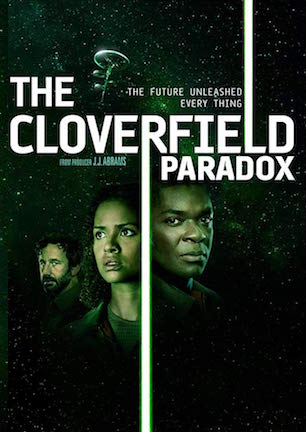Studio: Netflix
Director: Julius Onah
Writer: Oren Uziel, Doug Jung
Producer: J.J. Abrams, Lindsey Weber
Stars: Daniel Bruhl, Elizabeth Debicki, Aksel Hennie, Gugu Mbatha-Raw, Chris O’Dowd, John Ortiz, David Oyelowo, Zhang Ziyi, Roger Davies, Clover Nee
Review Score:
Summary:
An international team of astronauts experimenting with particle acceleration inadvertently creates a rip in reality.
Review:
Earth’s best hope of avoiding all out war lies aboard the Cloverfield Space Station. There, seven international astronauts endeavor to operate an experimental particle accelerator known as the Shepard. If successful, the Shepard could generate enough power to solve the global energy crisis that has countless countries at each other’s throats.
One small problem: over the course of two years, the science-minded crew has failed every one of their 46 firing attempts. One big problem: if they do manage to smash a Higgs boson, at least one expert claims Cloverfield could rip the fabric of space-time, causing multiple dimensions to intersect while possibly unleashing chaotic creatures.
That seems to be a far out theory until the Shepard finally fires its first beam. The resulting overload not only devastates the station, but it seemingly blinks Earth out of existence. Stranger still, the team earns a new member when a mysterious woman materializes inside a wall. As inexplicable events continue compounding their confusion, the Cloverfield crew comes to suspect the paradox they feared has come to fruition in the form of an altered reality.
Supposedly, the project previously known as “God Particle” was reworked into “The Cloverfield Paradox” at a script level during the film’s production. Suspiciously, it looks like the transformation actually took place in the editing room, as cutaway scenes constituting a loose Cloverfield connection feel more forcibly included than dad’s mistress at a family reunion.
SPOILERS
That loose connection concerns a husband, Michael, left behind by Cloverfield astronaut Ava, whose outer space experiments did more than transport her to a parallel dimension. The accelerator overload also unleashed massive monsters back home on Earth. While Ava and the others work to restore their reality, Michael navigates rubble, rescues a random orphan, and hides from kaiju in a fallout shelter during non-sequitur segments jarringly juxtaposed with the space station scenes.
Michael’s story stays so far off to the side, it may as well be from a separate movie. Essentially, it is.
END SPOILERS
Characters aboard the eponymous space station conspicuously never say the word ‘Cloverfield.’ In fact, all of the station’s branding, included embroidered patches on everyone’s jumpsuits, read ‘Helios.’ We can argue over what ‘Helios’ might mean to reference yet the fact remains, “The Cloverfield Paradox” smashes two ill-fitting fictions together in a bizarro parallel of the dimension-colliding plot.
Remove the Cloverfield connection, an easy enough option if one excises Michael’s moments along with an exposition-dumping Donal Logue cameo, and “The Cloverfield Paradox” admittedly isn’t the most unique piece of science-fiction. Sabotage from a secret mutineer, a heroic moment of self-sacrifice, and a body-bursting bit of bloody horror are just some of the been-down-this-road-before beats borrowed from other movies. “The Cloverfield Paradox” melds “The Martian” with “Gravity” (review here) with “Event Horizon” for cinematic style closer in spirit to “Alien” than to “Cloverfield.”
But I’m more lenient on the movie than other critics because when you separate its substance from the hullaballoo about surprise Super Bowl drops and shoehorned shared universe claptrap, “The Cloverfield Paradox” sustains engagement without being particularly novel. After enduring the fatigue of underwhelming outer space adventures from its immediate predecessors “Life” (review here) and “Alien: Covenant” (review here), “The Cloverfield Paradox” stands out for having more memorable moments, deeper drama, and better characters.
Name one of the astronauts in “Life.” How many people constituted the crew of “Alien: Covenant?” Forgetfulness will affect “The Cloverfield Paradox” in time too, though its cast has enough collective charisma to keep energy charged. With eight main characters, nine counting Michael on the ground, some suffer the unavoidable side effect of not enough development. Those that do launch individual arcs off the ground gain additional distance from a talented cast of diverse performers. These actors sell human emotion underneath the story even when it drowns in monster-related mania.
I’ll concede to the criticism that “The Cloverfield Paradox” can come across like a long “Star Trek” episode whose bumped-up budget lends a sharper than usual look. And a brief spotlight on comic Chris O’Dowd’s sentient severed arm features the kind of flourish “The Cloverfield Paradox” could use more of. But the movie applies its strong cast to a compelling concept and reaps the rewards of executing entertaining space suspense.
My favorable review score compensates for the unfair overlay of Cloverfield’s brand. It’s not “God Particle’s” fault that its intriguing “where did planet Earth go?” subplot never bears weight. “The Cloverfield Project” deflates that balloon by repeatedly boring us with Michael’s text message adventures.
As with “10 Cloverfield Lane” (review here), an insistence on establishing some semblance of a shared universe does more harm than good by being applied when it isn’t earned. Expectations associated with “Cloverfield” skew perception in ways these pseudo-sequels don’t deserve. A flimsy final minute reinforces that “The Cloverfield Paradox” is a pretty solid standalone story marred by having to double as a pretty poor Cloverfield spinoff.
I’m all for connecting each Cloverfield entry together in a manner that makes sense. In the meantime, maybe it’s better to stop trying so hard to link unrelated thrillers to a behemoth beast’s origin from a “found footage” film with faded relevance.
Review Score: 70






Too slow to ever reach a burn, “The Dreadful” doesn’t have many logs capable of catching fire in the first place, let alone a spark to ignite them.